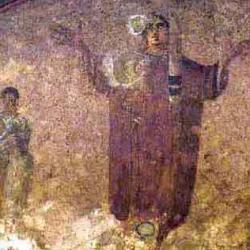Next door, my friend Gerald McDermott responds to my piece on tradition with a brief exposition of Newman’s theory of the development of doctrine. Gerry is right that I agree with a lot of what Newman has to say about tradition and development, and the corruptions that Newman protested were corruptions indeed (liberalism and antinomianism, not Lutheranism).
But I think I disagree, if not with Newman at least with some of the ways “development of doctrine” is construed.
Let me begin with a clarification. In saying that history leaves us open do the possibility of Protestantism, I wasn’t suggesting, as Gerry says, that theological history is a history of individuals who protested the prevailing tradition. I was suggesting that church history includes new initiatives, innovation, whether doctrinal or practical. Francis was an innovator, and initiated a new thread of the Christian tradition. I think Luther’s protest is one sort of innovation, but not the only kind.
Newman’s standards for judging a genuine tradition are, it seems to me, slippery in application. Who decides, for instance, what constitutes “continuity of principle”? How do we distinguish between doctrinal principle or substance (which is stable) and the changing form in which the substance is expressed? In some cases, claims of continuity begin to appear disingenuous. The form has changed so drastically that it’s hard to deny that the substance has changed too.
More specifically: What is the “principle” of the doctrine of justification—that it is a gracious act of God? That it is a moral and not forensic act? That it involves infusion rather than imputation? To Luther and Protestants generally, Luther’s doctrine was in continuity with the substance of orthodox understandings of grace. Whether or not Luther is seen as adhering to the principle is a matter of judgment. And if so, then I’m not sure how useful Newman’s notes are.
I suspect there are a couple of underlying issues. The first is epistemological: Do we think of theoretical development in, say, science in the same way we think about the development of doctrine? Is Newton a development of the “inner principles” of prior theories, or Einstein of Newton, or Copernicus of Ptolemy? Perhaps in some ways that is true, and there is continuity through change. But Kuhn persuasively argued that scientific advances may be “revolutionary” eruptions that seek not to develop inner principles but to resolve perceived anomalies. There is no doubt continuity; but the innovation goes down pretty deep, as Einstein recognized when he contemplated Bohr. My question: Can doctrine or theology develop in this same revolutionary or disruptive way? If not, why not? What account for the epistemological or methodological difference between science and theology, if there is one? I smell a nature/grace dichotomy lurking under the floorboards, but I may be wrong: I smell that a lot.
Conceptions of history are also at stake here. We can put it starkly: Is history front-loaded or back-loaded? Is history the unfolding of what’s already there, or is it a movement toward something that is not yet arrived? Or put it this way: Is history a seamless web or is it pock-marked with the scars of time and human ingenuity and demonism? In each case we want to say both, I suspect; we might want to combine them (Kuhnian style) by saying that revolutions are followed by a period of normal science, during which the seeds are sown for the next revolution. But if history does include disruptions, and if the church is in actual history, then we seem to be left again with openness to the possibility of Protestantism.
I am mainly raising questions here, but let me conclude with something more assertive. Jesus is the model of continuity and innovation. Everything He says and does is in perfect harmony with the law and the prophets, and yet what He says and does is such a surprising harmonization on the law and the prophets that He’s seen as a dangerous law-breaker. Resurrection is about as disruptive an event as one can imagine, and yet even resurrection was “according to the Scriptures,” an inner development of what was already within the tradition. Jesus’ work combines, as N. T. Wright says, covenant continuity with apocalyptic surprise, and you can’t lose either without distorting the work of Jesus. And to this I would add Rosenstock-Huessy’s claim that the Spirit who raised Jesus is still at work, breaking through ruts and bad habits, moving toward a future that is already here because the Spirit is here.
So, a revised conclusion, and let’s leave Newman out of it: To be deeply in history is to be open to the possibility of apocalypse.















